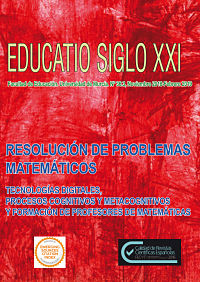Problem solving as a teacher professional development strategy: tensions affecting teachers
Abstract
Teacher professional development programs aim to generate changes in teachers, in their knowledge, beliefs or practices. For these changes to occur, the professional development experience should cause the teacher to question aspects related to his/her profession. In this article, we present a problem-solving-based professional development strategy for mathematics teachers and we offer an analysis of the tensions which emerged. To do this, we carried out a case study based on a workshop called RPAula that took place in Chile with elementary teachers. The results show that participation in this workshop causes tensions related to teachers’ expectations about their students, their beliefs about teaching and learning, and their models of mathematics teaching.
Downloads
-
Abstract1668
-
PDF (Español (España))1833
References
Ávalos, B. (2011). Teacher professional development in Teaching and Teacher Education over ten years. Teaching and Teacher Education, 27, 10-20.
Berry, A. (2008). Tensions in Teaching about Teaching: Understanding Practice as a Teacher Educator. Dordrecht, The Netherlands: Springer.
Borko, H. (2004). Professional Development and Teacher Learning: Mapping the Terrain. Educational Researcher, 33 (8), 3-15.
Brown, R. E. (2010). Tensions faced by mathematics professional developers. The Mathematics Educator, 20 (1), 3–7.
Chapman, O. (2015). Mathematics teachers’ knowledge for teaching problem solving. LUMAT, 3(1), 19-36.
Garet, M.S., Porter, A.C., Desimone, L., Birman, B.F., & Suk Yoon, K. (2001). What Makes Professional Development Effective? Results from a National Sample of Teachers. American Educational Research Journal, 38, 915-945. DOI: 10.3102/00028312038004915
Guskey, T.R. (2002). Professional Development and Teacher Change. Teachers and Teaching: theory and practice, 8 (3/4), 381-391. DOI: 10.1080/135406002100000512
Lampert, M. (1985). How do teachers manage to teach? Perspectives on problems in practice. Harvard Educational Review, 55(2), 178-195.
Liljedahl, P., Santos-Trigo, M., Malaspina, U. y Bruder, R. (Eds.). (2016). Problem Solving and Mathematics Education. Switzerland: Springer. DOI: 10.1007/978-3-319-40730-2
Marrongelle, K., Sztajn, P., & Smith, M. (2013). Scaling Up Professional Development in an Era of Common State Standards. Journal of Teacher Education, 64, 202-211- DOI: 10.1177/0022487112473838
Nipper, K., Ricks, T., Kilpatrick, J., Mayhew, L., Thomas, S., Kwon, N. Y., Klerlein, J. T., Hembree, D. (2011). Teacher tensions: expectations in a professional development institute. Journal of Mathematics Teacher Education, 14 (5), 375-392.
Nipper, K., y Sztajn, P. (2008). Expanding the instructional triangle: Conceptualizing mathematics teacher development. Journal of Mathematics Teacher Education, 11 (4), 333 341.
Rouleau, A. (2017). Tensions in the role of mathematics coaches. En T. Dooley y G. Gueudet (Eds.), Proceedings of the 10th Congress of European Research in Mathematics Education (CERME) (pp. 2988-2995). Dublin, Ireland: DCU Institute of Education and ERME.
Rouleau, A., y Liljedahl, P. (2017). Teacher Tensions: The Case of Naomi. En C. Andrà, D. Brunetto, E. Levenson y P. Liljedahl (Eds.), Teaching and Learning in Maths Classrooms. Research in Matematics Education (pp. 155-162). Cham: Springer. DOI: https://doi.org/10.1007/978-3-319-49232-2_15
Tan, A. L., Chang, C. H., y Teng, P. (2015). Tensions and dilemmas in teacher professional development. Procedia-Social and Behavioral Sciences, 174, 1583-1591.
Original work publishes in this journal is subject to the following terms:
1. Murcia University Press (the publishing house) holds the copyright of the publishes work, and favours and allows their reutilization under the use license stated in point 2.
© Servicio de Publicaciones, Universidad de Murcia, 2015
2. Work is published in the electronic edition under a license (Creative Commons Reconocimiento-NoComercial-SinObraDerivada 4.0 España (legal text). They can be copied, used, disseminated, transmitted and publicly presented, as long as: i) authorship and original publication source is acknowledged (journal, publishing house and URL of the work); ii) are not used for commercial purposes; iii) the existence and specifications of this use license is stated.
3. Conditions for self-archive. Authors are allowed and encouraged to disseminate electronically the pre-pint (before review) and/or post-print (accepted for publication) versions of their work before their publication since that favours earlier circulation and dissemination resulting in an increased chance for the authors to be cited and for the work to reach a bigger share of the academic community. Colour: RoMEO: green.








